Top 10: Cloud Big Data platforms
Updated: August 01, 2023
Cloud Big Data platforms are powerful and scalable digital solutions that provide businesses with the capability to store, process, and analyze vast amounts of data in the cloud. These platforms leverage cloud computing infrastructure and distributed data processing technologies to handle large-scale data sets from various sources. Cloud Big Data platforms offer a wide range of tools and services, such as data storage, data processing frameworks like Apache Hadoop and Spark, machine learning capabilities, and data visualization tools. By utilizing these platforms, businesses can gain valuable insights from their data, make data-driven decisions, and uncover patterns and trends that can drive innovation and business growth. Cloud Big Data platforms are particularly advantageous for organizations dealing with massive volumes of data, as they offer cost-effective and flexible solutions that can scale up or down based on the data processing requirements. With the ability to handle Big Data analytics in the cloud, businesses can accelerate their data analysis processes, reduce infrastructure costs, and unlock the full potential of their data assets.
Cloud Big Data platforms provide Big Data as a Service
See also: Top 10 Big Data platforms
See also: Top 10 Big Data platforms
2021. Firebolt raises $127M for its new approach to cheaper and more efficient big data analytics
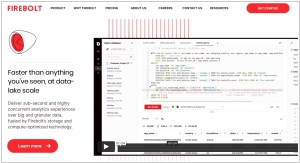
Snowflake revolutionized the realm of data warehousing for numerous companies, opening up new possibilities. Now, a startup aiming to disrupt the disruptor, Firebolt, has successfully secured $127 million in Series B funding. Firebolt asserts that its performance surpasses other data warehouses by up to 182 times, thanks to its SQL-based system. This system incorporates groundbreaking techniques in compression and data parsing, derived from academic research that had not yet been implemented elsewhere. By employing these innovative methods, Firebolt enables data to be handled more efficiently, resulting in lighter data footprints. Consequently, data lakes can seamlessly integrate with a broader data ecosystem, significantly reducing the cloud capacity requirements and lowering costs for organizations.
2020. Firebolt raises $37M to take on Snowflake, Amazon and Google with a new approach to data warehousing
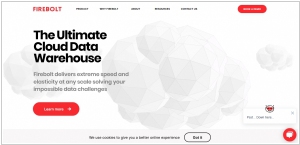
Firebolt, a pioneering startup, has secured $37 million in funding as it aims to challenge industry giants such as Snowflake, Amazon, and Google in the realm of enterprise data analytics. Firebolt has developed an advanced approach to data assessment, analysis, and utilization, offering a more comprehensive solution. While current data warehouses have primarily addressed the challenge of cloud migration and scalability, Firebolt shifts the focus towards speed and efficiency. The startup asserts that its performance surpasses other data warehouses by up to 182 times. Firebolt utilizes a SQL-based system built upon novel principles derived from academic research. These principles revolutionize data handling by employing innovative compression techniques and advanced data parsing methods. Furthermore, Firebolt facilitates seamless integration with data lakes, forming a cohesive data ecosystem. As a result, the platform significantly reduces cloud capacity requirements, translating into enhanced operational efficiency.
2020. Panoply raises $10M for its cloud data platform
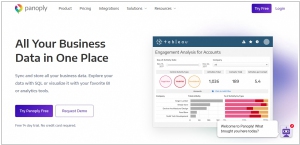
Panoply, a platform dedicated to simplifying the setup of data warehousing and enabling data analysis through standard SQL queries, has successfully raised $10 million in funding. Since its launch in 2015, the company has remained committed to its original vision of democratizing access to data warehousing and the accompanying analytics capabilities. In recent years, Panoply has expanded its platform by incorporating more code-free data integrations, allowing businesses to effortlessly import data from a diverse range of sources. Notable integrations include Salesforce, HubSpot, NetSuite, Xero, Quickbooks, Freshworks, and others. Furthermore, Panoply seamlessly integrates with leading data warehousing services such as Google's BigQuery and Amazon's Redshift, along with a comprehensive range of BI and analytics tools.
2020. Qumulo scores $125M Series E on $1.2B valuation as storage biz accelerates
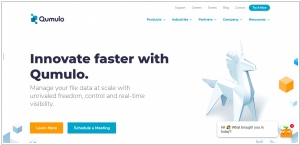
Qumulo, a startup specializing in storage solutions for managing large volumes of data, has recently secured a $125 million Series E investment. Qumulo's growth is driven by the increasing volume of unstructured data, which aligns with the company's storage expertise, particularly as businesses transition more activities online during the pandemic. Currently, Qumulo boasts 400 customers and a workforce of over 300 employees, with plans to expand by another 100 by the end of the year. Since its establishment in 2012, the company initially conducted extensive market research before developing its inaugural product. In 2014, it introduced a storage appliance, but over time, Qumulo has progressively shifted its focus towards hybrid solutions.
2018. Big Data platforms Cloudera and Hortonworks merge

Over time, Hadoop, the once-prominent open-source platform, fostered the growth of numerous companies and an ecosystem of vendors. However, the complexity associated with Hadoop posed a significant challenge. This is where companies like Hortonworks and Cloudera stepped in, offering packaged solutions for IT departments seeking the advantages of a big data processing platform without the need to build Hadoop from scratch. These companies provided various approaches to tackle the complexity, but as cloud-based big data solutions gained prominence, the notion of implementing a Hadoop system from scratch became less compelling, even with the assistance of firms like Cloudera and Hortonworks. Today, both companies have announced their merger in a deal valued at $5.2 billion. The combined entity will serve a customer base of 2,500, generate $720 million in revenue, and possess $500 million in cash reserves, all while remaining debt-free.
2015. Hortonworks acquired dataflow solutions developer Onyara
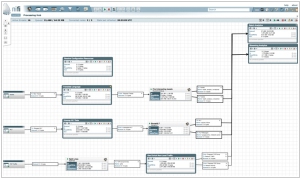
Hortonworks, a publicly traded company that offers a commercial distribution of the open-source big data software Hadoop, has announced its acquisition of Onyara, an early-stage startup known for the development of Apache NiFi. This open-source software originated within the National Security Agency (NSA) and enables efficient delivery of sensor data to appropriate systems while maintaining data tracking capabilities. In addition to previous acquisitions like XA Secure and SequenceIQ, Hortonworks has now expanded its portfolio with the intention of introducing a new subscription service based on Apache NiFi. This subscription will be marketed under the name Hortonworks DataFlow.
2014. Big Data as a Service company Qubole raises $13 million
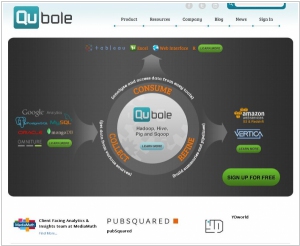
Hadoop-as-a-service startup, Qubole, has secured $13 million in a series B venture capital funding round. Qubole operates on the Amazon Web Services cloud and is also compatible with Google Compute Engine. It functions as a cloud-native Hadoop service, featuring a user-friendly graphical interface, connectors to various data sources (including cloud object stores), and takes advantage of cloud capabilities such as autoscaling and spot pricing for computing resources. Qubole stands out by offering optimized versions of Hive and other MapReduce-based tools, but it also enables data analysis through the use of Facebook's Presto SQL-on-Hadoop engine. Additionally, Qubole is developing a service centered around the Apache Spark framework, which has gained significant popularity due to its speed and efficiency.
2014. Enterprise Hadoop provider Hortonworks filed for an IPO

Hortonworks, the company developing commercial Hadoop technology, has submitted its initial public offering (IPO) filing. With over $33 million in revenue and an operating loss of nearly $88 million, the company has showcased its financial performance for the current year. Hortonworks emerged as a separate entity from Yahoo in 2011 and provides a comprehensive big data processing platform. This platform enables the processing of diverse data types, including SQL and NoSQL sources, and facilitates data search and visualization using various analytics tools. Hortonworks is renowned for its exclusive focus on Hadoop, offering a solution devoid of any proprietary extensions.
2013. SAP makes big companies effective with Big Data. Competitors are crying
In recent years, SAP was probably the least innovative IT giant (compared to competitors Oracle, Microsoft, IBM). All SAP's own innovative projects mostly failed (remember Business ByDesign), and the only thing that SAP could do - is buying other companies (SuccessFactors, SyBase, Ariba). But at this time, SAP is going to outdo all the competitors on the wave of new trendy technology - Big Data. What is Big Data? ***


